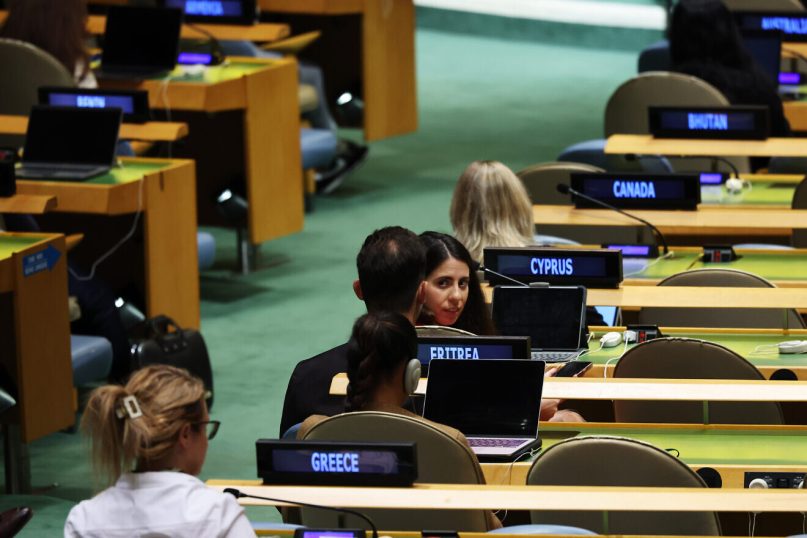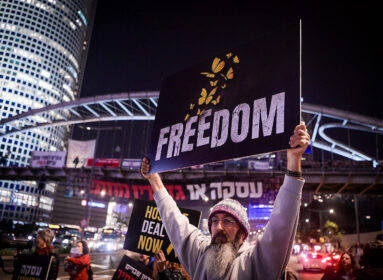
(JNS) Once each year, the world’s top leaders and diplomats converge on New York City for the U.N. General Assembly.
While the speeches in the General Assembly hall usually seize the headlines, much of the more consequential business takes place in the conference rooms and cafeterias, where delegations hold bilateral talks with long-standing and emerging partners.Subscribe to The JNS Daily Syndicate by email and never miss our top storiesFree sign upBy signing up, you agree to receive emails from JNS and allied pro-Israel organizations.
It is no different for the international Jewish community, which holds a diplomatic blitz of its own each September as well to push its priorities, explore potential partnerships and put out fires in trouble spots around the world.
Ted Deutch, CEO of the American Jewish Committee, told JNS that his organization held close to 100 meetings with prime ministers, foreign ministers, heads of state and other officials during its annual “Diplomatic Marathon.”
According to Deutch, it’s “all to advance the interests of the Jewish community, making sure that every person we meet with understands what Israel is facing, the need for Israel to be able to defend itself, the challenges faced by the people of Israel and the global Jewish community, and the need to fight antisemitism.” Related Articles
Asked whether he felt like this year’s meetings were fruitful, Deutch said that “they’re very honest. We tell world leaders exactly what we think they need to hear, so that it counteracts so much of the, frankly, the nonsense that they hear from those trying to marginalize Israel’s place in the world, to demonize Israel. We want them to understand the truth about what Israel faces.”
‘A tool in the toolbox of fighting antisemitism’
The AJC held an event on the evening of Sept. 25 to highlight its work. The Global Jewish Diplomacy Reception has run for three decades on the sidelines of the UNGA. This year’s reception played host to Ambassador Deborah Lipstadt, the U.S. State Department’s special envoy to monitor and combat antisemitism, along with Ali Rashid Al Nuaimi, chairman of the Defense, Interior and Foreign Affairs Committee of the UAE Federal National Council.
Lipstadt told JNS that she had “some very good interactions with a variety of countries—Western European, Latin American countries, Latin American media, Middle Eastern media.”
“We had a diverse group of people coming out to honor not only the prime minister for his work, but this message of unity and solidarity.”
Arthur Maserjian, chief of staff at the Combat Antisemitism Movement
She said most of the conversations revolved around the Global Guidelines to Counter Antisemitism, an international compact released in July that seeks to set a globally defined framework of best practices for individual countries to adopt in their own battles against Jew-hatred.
“It’s not going to solve antisemitism, but it’s a tool in the toolbox of fighting antisemitism,” Lipstadt told JNS. “It calls on leaders to speak out. It calls on opposing antisemitism, irrespective of where it comes from, it calls for education.”
The guidelines also recommend using the International Holocaust Remembrance Alliance’s (IHRA) working definition of antisemitism that many Israeli critics refuse to adopt, purportedly because it limits criticism of the Jewish state. Proponents of the IHRA definition point to specific language in the definition which explicitly says the opposite.
“It also calls for institutions, nations, states, universities, schools, to protect their vulnerable population—in this case, Jews—and to enforce their laws. So we think it’s an important tool which will help people hold their leaders to account in the fight against antisemitism,” said Lipstadt, whose office declined to reveal a list of the countries she had met with in New York City.
“It’s important for humanity.”
Robert Singer, chairman of the Center for Jewish Impact
But she did reveal to those in attendance on Wednesday that Albania had become the 42nd country—and the first Muslim-majority state—to adopt the global guidelines document.
The Combat Antisemitism Movement, in partnership with the Center for Jewish Impact (CJI) and B’nai B’rith International, hosted Albanian Prime Minister Edi Rama on the evening of Sept. 26 to pay tribute to him and his country for their steadfast defense and protection of the national Jewish population, including during the Holocaust.
“I think especially here in the United States, the Jewish community is facing unprecedented rises in antisemitism since Oct. 7, and people are looking around and wondering where our traditional allies are,” Arthur Maserjian, chief of staff at the Combat Antisemitism Movement, told JNS. “And we wanted to take this opportunity during the U.N. week to really recognize the allyship and friendship of the prime minister of Albania and the people of Albania for their support for the Jewish community over history, really, and at this moment in time.”
The event featured a broad mix of the diplomatic community, including U.N. missions, local consulates and CAM’s partner organizations, which include Christian, Muslim and other Jewish organizations.
“We had a diverse group of people coming out to honor not only the prime minister for his work, but this message of unity and solidarity,” said Maserjian.
Robert Singer, chairman of the Center for Jewish Impact, called the event “important for people in Albania, important for the Jewish community, and I would say that it’s important also for humanity.”
Singer added that with Albania being both a moderate Muslim country and located in Europe, where both the Holocaust and modern-day attacks are taking place, “it really gives a kind of good basis for future relations with the moderate Muslim and Jewish community, and especially these days when you have all these issues that we have with the Muslim communities in Europe.”
While Singer meets fairly frequently with U.N. Secretary-General António Guterres, he told JNS that he was frustrated by the leader’s lack of results.
“From what I understand, on the issues of the hostages, he’s doing his best,” said Singer. “But I will say that on all the rest, his position is absolutely unacceptable to the Jewish community. We make it very clear to him, and I hope that to some extent it will change.”

‘A laundry list of arrows’
Daniel S. Mariaschin, CEO of B’nai B’rith International, said his organization met with countries that “are more than problematic.”
That included Belgium, Spain and Norway, with B’nai B’rith raising the issues of those countries’ support for a recent Palestinian-drafted U.N. General Assembly resolution; the Israeli issues before both the International Court of Justice and the International Criminal Court; and antisemitism issues within each state.
Mariaschin called it “a laundry list of arrows that are being sent into Israel.”
He said when those countries were confronted, “they would come back about humanitarian law. They would come back about Israel has a right to defend itself, but it’s how it defends itself. All of the arguments that we’ve heard over the past year from these incessant critics is what we got back on the other side.”
On the flip side, B’nai B’rith also met with Czechs, during which “we expressed our appreciation for their long-standing and their consistent voting patterns at the U.N.”
“Many of them are doing a lot, but obviously, it’s not enough.”
Marina Rosenberg, a former Israeli diplomat who serves as the ADL’s senior vice president for international affairs
He also said the group met with some erstwhile partners of Israel who are still problematic when it comes to the issue of Holocaust restitution.
B’nai B’rith works in tandem during U.N. General Assembly week with a consortium, including the Anti-Defamation League, the Conference of President of Major American Jewish Organizations, the National Coalition Supporting Eurasian Jewry and the World Jewish Congress.
The group, Mariaschin said, rotates who is in the chair for each meeting and divides up the questions, “so it’s a cooperative, collaborative effort. The Jewish community is stronger when we act in tandem in these situations, especially at the U.N.”
Ultimately, Mariaschin told JNS that the purpose of meeting with critics is not necessarily to change their votes overnight.
“The most important part of this is really speaking truth to power,” he said. “It’s the opportunity in one week to engage not only with Israel’s friends but also its harshest critics. And there’s no substitute for doing this in person.
‘It affects Jews as a whole’
Marina Rosenberg, a former Israeli diplomat who serves as the ADL’s senior vice president for international affairs, told JNS that most of her meetings were “quite discouraging” while adding that “some beacons of light were more positive.”
Among the latter was a meeting with Argentinian Foreign Minister Diana Mondino. Argentinian President Javier Milei has quickly established himself as one of Israel’s most ardent backers on the international stage.
Rosenberg said that the meeting, which concluded her week, “was very encouraging.”
“It’s good to have friends that are not afraid not just to publicly support Israel and publicly condemn extremism and antisemitism but also to do the right thing” in the United Nations, she said, pointing to Paraguay, Italy and Hungary as being in the same boat.
“It’s a cooperative, collaborative effort.”
Daniel S. Mariaschin, CEO of B’nai B’rith International
Rosenberg told JNS there were three main requests in each meeting on the UNGA sidelines.
The first was to ask each country to hold Iran and its terrorist proxies accountable.
The second focus was antisemitism and for those countries to address the rising global antisemitism post-Oct. 7, when Hamas infiltrated Israel’s southern border and murdered 1,200 people; wounded thousands of others; and took as many as 250 men, women and children hostage back to the Gaza Strip.
“So many of them are doing a lot, but obviously, it’s not enough,” said Rosenberg. “Others are not doing enough, and we asked them to implement the Global Guidelines for Countering Antisemitism.”
The third request was to pressure the United Nations and all its agencies to “actually fulfill their responsibilities. And this, of course, means ensuring that Hamas releases all the hostages, holds UNRWA responsible for supporting, directly and indirectly, the atrocities of Oct. 7, and for UNIFIL to fulfill its job in the north,” she said.
Rosenberg said the families of hostages held in Gaza were invited to many of the meetings, as were certain American Jewish women’s organizations, in order to raise the issue of the sexual violence used by Hamas as a weapon of war.
“We want them to understand the truth about what Israel faces.”
Ted Deutch, CEO of the American Jewish Committee
Like Deutch, Rosenberg said it is important for the ADL to meet more problematic countries “to share our views of everything that they’re doing and how counterproductive those measures are—if it’s vis à vis Israel or countering antisemitism or on both issues.”
She said the problems go beyond bilateral relations between Israel and those countries, like Norway and Spain.
“It affects the local Jewish communities in those countries, and it affects Jews as a whole,” said Rosenberg, explaining that she expressed “very clear rejection of certain actions, including, for example, recognizing the Palestinian state post-Oct 7.”
She called some of the anti-Israel speeches at the United Nations this past week “outrageous,” promoting not just a narrative far from the truth but direct and indirect hate “against not just Israel but against so-called Zionists, which basically means Jews.”
The former diplomat said she tried to make the connection between rising antisemitism in the likes of Norway and Spain with the political stances of their governments, explaining that those nations should be attempting to make clear that their disagreements with the government of Israel are not disagreements with the larger Jewish world.
“I’m not sure that we managed to convince them, but it was important to raise this issue,” she told JNS.
Still, Rosenberg said she was thankful those countries chose to meet, considering others did not. The raw number of meetings taken by diplomatic delegations was down this year.
“When it’s one or two, OK, it happens. Sometimes, it’s a matter of the timing and changes in programs of the prime minister, president or foreign minister,” said Rosenberg. “But when it’s more than five or six, you understand that it’s a trend, and therefore, I do appreciate that even countries that knew that it was going to be a difficult meeting still agreed to meet, and were still open for dialogue and exchange of opinion.”









 Southern New England Jewish Ledger
Southern New England Jewish Ledger














